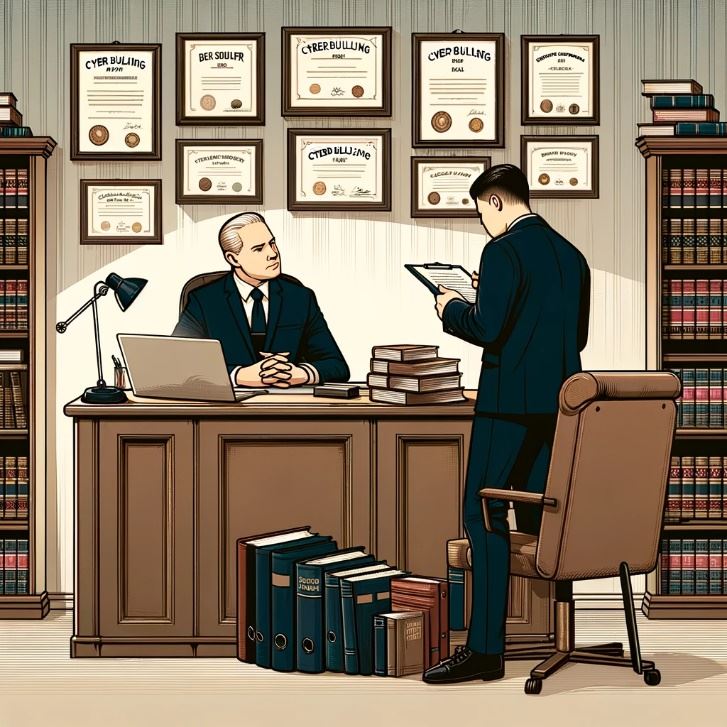
Austin Cyber Bullying Lawyer
If you find yourself accused of cyber bullying, it's important to take the situation seriously and act quickly, as the consequences can be severe. Cyber bullying means using digital technology, like phones or computers, to hurt or intimidate someone else. This behavior can lead to serious legal trouble, including potential fines and jail time, for those who are convicted.
Facing cyber bullying charges? Know your rights. Call Cofer & Connelly, PLLC at (512) 991-0576 or reach out online. With over 100 years of combined defense experience, 25,000 cases managed, and more than 300 jury trials in Texas, our attorneys deliver personalized defense strategies.
What is Cyber Bullying?
According to Texas Penal Code Section 42.07, cyber bullying involves using technology to harm others. If you use your phone or computer to send messages or posts that are meant to upset someone else, that might be considered cyber bullying under Texas law. Specifically, if you intentionally harass, annoy, alarm, abuse, torment, or embarrass someone through digital means, you could be breaking the law.
To be accused of cyber bullying, you must engage in certain actions. For example, making obscene comments during a phone call or online, threatening to hurt someone or their family, or spreading false alarms about serious injuries or deaths can all fall under cyber bullying. Even actions like calling someone repeatedly or not hanging up the phone, letting others use your phone to harass someone, or sending many unwanted messages online are considered cyber bullying.
In more severe forms, if you publish harmful messages repeatedly on websites or social media, especially in ways that could seriously upset someone, it counts too. Recently, Texas law also began to tackle the use of tracking apps or devices to monitor someone without their permission as a form of cyber bullying.
Prosecutors looking to convict someone of cyber bullying need to prove that the actions were intentional and fit the descriptions in the law. For instance, they must show that you knew what you were doing was likely to upset the victim and that you did it on purpose to cause distress or harm.
What Are the Penalties for Cyber Bullying?
In Texas, the penalties for cyber bullying can vary depending on a few factors, including whether you've done it before. Generally, cyber bullying is treated as a Class B misdemeanor, which can lead to jail time of up to 180 days, a fine of up to $2,000, or both. However, if you have been convicted of cyber bullying before, the charge can be raised to a Class A misdemeanor. This higher charge can mean up to one year in jail, a fine of up to $4,000, or both.
The law gets even stricter if the cyber bullying involves specific circumstances. For example, if the bullying targets a child under 18 with the intent of causing that child to harm themselves or even consider suicide, the penalties can increase. Also, if you've ignored a court order related to cyber bullying before, this will also affect the severity of the penalties.
If you are convicted of cyber bullying in Texas, you might not have to go to jail. Instead, you could be placed under community supervision. This means you stay in your community but must follow certain rules and meet with a probation officer regularly. You might also need to attend counseling sessions, perform community service, or participate in educational programs about bullying and its impacts. These alternatives focus on rehabilitating you and preventing future offenses without the need for incarceration.
Being convicted of cyber bullying can affect your life in ways beyond just serving time. With a criminal record, you could find it hard to get jobs, especially if they involve trust or technology. You might also face problems when trying to rent a house or apply for college.
Criminal Process for Individuals Facing Cyber Bullying Charges
If you're investigated or charged with cyber bullying in Texas, the process starts when someone files a complaint against you. Police might then investigate to gather evidence. If there's enough evidence, you could be arrested. After arrest, you'll likely have a bail hearing where a judge decides if you can be released before trial. If your case goes to trial, you will be able to defend yourself in court. During the trial, both sides will present evidence and arguments. If you are found guilty, the judge will decide your sentence, which could include options other than jail, like community supervision or counseling. Throughout this process, you have the right to have a cyber bullying lawyer to help you at every step.
Potential Defenses in Cyber Bullying Cases
If you're facing charges of cyber bullying under Texas law, it's important to understand your defense options. One common defense is lack of intent. The law requires proof that you intended to harass, annoy, or alarm someone. If your lawyer can show that your actions were misunderstood or lacked this specific intent, you might have a strong defense.
Another defense might be mistaken identity. In the digital world, proving who is actually behind a computer or device can be complicated. If there's any doubt that you were the one who sent the messages or made the calls, this could be a key point in your defense.
Consent is another potential defense. If the person who received the messages or calls had agreed to this kind of interaction, and understood the nature of the communications, this might mitigate the charges against you. However, consent in these cases can be tricky and depends heavily on the context and previous relationship between the parties.
Finally, if your communications were related to a matter of public concern, this might also serve as a defense. Texas law excludes certain communications made in connection with public issues from the definition of harassment. Your lawyer can analyze whether your communications fall under this exemption.
Understanding these defenses and discussing them with your lawyer will help you better handle your case and seek the best possible outcome.
 How a Cyber Bullying Attorney Can Help
How a Cyber Bullying Attorney Can Help
When you're charged cyber bullying, having a cyber crime lawyer by your side is crucial. Your lawyer will work to protect your rights and aim to get the best outcome for you. They will look into the evidence, challenge any points that seem weak or incorrect, and argue on your behalf.
Your lawyer will also explain the charges against you and what they mean in plain terms. They will guide you through each step of the legal process, from the initial hearing to the trial, if necessary. They make sure you understand what's happening and what your options are.
Your lawyer might negotiate with the prosecutor to reduce your charges or the severity of the potential penalties. If your case goes to trial, your lawyer will represent you in court, presenting evidence and arguments to show why you should not be found guilty of the charges.
Overall, your criminal defense lawyer is your advocate, offering you legal advice and defending you aggressively. They are there to use their knowledge and skills to help you through a challenging time.
Frequently Asked Questions
What is cyber bullying? Cyber bullying involves using digital platforms to intimidate, harass, or upset others.
How can cyber bullying impact someone legally? If proven, it can lead to misdemeanor charges, fines, and even jail time.
What should I do if accused of cyber bullying? Contact a lawyer immediately to discuss your situation and options.
Are there legal defenses against cyber bullying accusations? Yes, potential defenses include lack of intent, mistaken identity, or proving the behavior wasn't harassment.
Can minors be charged with cyber bullying? Yes, minors can face juvenile delinquency proceedings.
What evidence is used in cyber bullying cases? Digital communications, like emails and texts, are key evidence.
What does "harassment" mean in legal terms? It refers to actions designed to cause distress or fear.
Can I be sued if someone else uses my account to cyber bully? You might be liable if you knowingly allowed your account to be used for harassment.
What are the consequences of cyber bullying in schools? Schools may impose suspensions or expulsions, and law enforcement could get involved.
Contact Our Austin Cyber Bullying Lawyers Today
If you're facing charges of cyber bullying, it's crucial to understand your legal rights and options. Contact Cofer & Connelly, PLLC by calling (512) 991-0576 or contacting us online for a consultation with a cyber bullying attorney. People choose our firm because we bring over 100 years of defense experience, have managed over 25,000 cases, and fought in more than 300 jury trials right here in Texas. Our experienced cyber bullying attorneys in Austin will provide you with personalized advice and a strong defense to the charges.

-
"Excellent all around. Highly recommend."W. N.
-
"I am eternally grateful for all of the efforts they put in to go above and beyond for everyone they help."Former Client
-
"They really listen to and care about their client's needs and consistently fight for the best outcome! I am eternally grateful for all of the effort they put in to go above and beyond for everyone they help."C.D.
-
103 Years of Experience
-
32,000 Cases
-
357 Trials





















